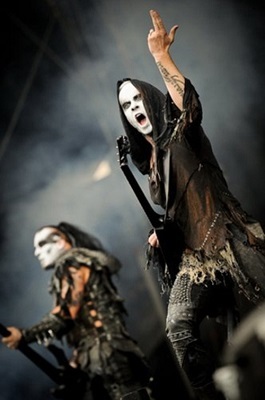Tradition holds that Lucifer/Satan got tossed from heaven for the sin of pride. Why? say most Satanists. Pride's no sin. Anton LaVey's creed of personal strength and self-reliance makes no apologies.
A good devil's disciple, Behemoth metal captain Nergal (named after a Mesopotamian solar/underworld deity) always figured he could take care ov himself. But in 2010, following his band's acclaimed "Evangelion" album, the Polish vocalist-guitarist, diagnosed with leukemia, found he needed help: from doctors, from friends, from the donor who provided him with replacement bone marrow.
In a Behemoth press release, Nergal admitted that the experience taught him there were things he couldn't control. He had guts and determination, but "I'm just a human being, after all." His current remission is partly luck.
Nergal even acknowledged that he couldn't fully control his music; his band might throw every thunderbolt and magick spell into an album without knowing how it would turn out. Well, he now knows that Behemoth's new "The Satanist" turned out to be quite good. I mean evil.
Founded in 1991, Behemoth have been making powerful, dark-riffing, relentless records for aeons. Nergal's new perspective, though, has given "The Satanist" greater depth -- a new human complexity, if that's not an insult.
Layers and layers of music pile up, boiling together in a cloudy borscht that seems to push riffs, rhythms and solos to the bubbling top almost at random. I've previously compared Behemoth to '60s energy jazz, and the parallels of Inferno's cage-rattling drums and Nergal's damnably mournful guitar to Sunny Murray's traps and Albert Ayler's sax have never felt closer. Parts of the songs "Messe Noir" and "Amen" verge on total abstraction.
Like every metal guitarist, Nergal enjoys shitloads of distortion. And what happens when you multitrack lots of distorted guitars? The distortion itself builds into a parallel instrument, an omnipresent atmosphere like a warehouse full of dry cornflakes whipped in a gargantuan electric blender. Nergal doesn't shrink from this distortion dominance; maybe not since WASP's 1997 "Kill Fuck Die" has a metal album used murk this effectively.
In striking stereo, anvil bells accompany a funeral procession to a Bach-organ-inhabited chapel of darkness on "Blow Your Trumpets Gabriel." An Orc charge shakes the ground on "Ora Pro Nobis Lucifer." "O Father O Satan O Sun!" plods to album's end in an extended coda featuring a grasping half-step guitar figure that has served as a motif throughout the album.
Knowing that pressure can't serve unless sometimes abated, Nergal inserts occasional snatches of bright silence, making the dynamics jump like a startled rat when the noise resumes. Stretches of unexpected acoustic-guitar arpeggios and even an oboe (on "In the Absence ov Light") crop up now and then. The riffs grab you, and the arrangements will keep you coming back.
Nergal shows off his ax skills in unusual ways. Although he shreds some, melodic development and emotion are the soul of his few solos, and here he often mixes them low, to sound as if he's climbing out of a deep pit. Which, of course, he did in real life. "I'm most complete yet so undone," he coughs on "O Father."
That's rare humility from a man whose lyrics speak almost exclusively from the POV of Lucifer. Though the word "satan" owns several linguistic roots -- adversary, prosecutor, the remote one -- Nergal picks "accuser," a tag that serves well in his crusade against the Judeo-Christian lineage. Nergal's Catholic upbringing generated a not-untypical revulsion, useful if only to inspire images like "I saw the Virgin's cunt spawning forth the Snake" and proud self-descriptions by Satan as a "great volcano of excrement" ready to swamp the kults that have torn the world with war and hypocrisy.
Heck, any liberal (not only most every modern-metal band) could sometimes despise Christianity -- the institution, as opposed to its nominal founder. Although Nergal promotes "The Satanist" as "a nail through the hand of Jesus Christ," he's likely aware that the carpenter's son would be more disgusted than the metalman himself (who's been tried in Poland for insulting religious groups) by the spectacles wrought in His name. Satanists and the Gospel of John both claim Gnostic identification with the Light; flip a coin.
That's the anti-Christian side of Behemoth. But then there's the anti-Judaism side, where the chortlin' lyrics about Satan raping daughters of Zion and eradicating the Root of David ring too specific. It's one thing to fight monotheism (Islam somehow immune), and another, especially if you're Polish, to suborn genocide. If Nergal even metaphorically aligns with that, then fuck him.
Rather than the ruthless Accuser, I prefer the injured, conflicted, multidimensional Satanist, the one whom Nergal causes to pray, "Oh Lord, whence came this doubt? Let loose my shackles." Between that spirit and the other rebel who begged in Gethsemane, "Let this cup pass from me," there ain't a hell of a lot of difference.
* * *
Behemoth plays House of Blues on Saturday, April 5.
To read the lyrics to "The Satanist," click on the individual songs in the LIBER SATANIST section of Behemoth's web site.

